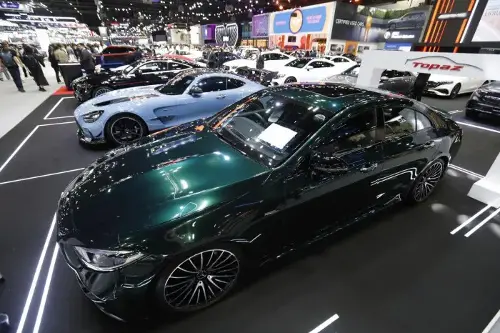
Many electric vehicle manufacturers are considering forgoing subsidies under the state's EV incentive scheme as the automotive industry remains sluggish, causing them to adjust production plans, says the Electric Vehicle Association of Thailand (EVAT).
EV makers who participated in the scheme dubbed EV3.0 were granted lower excise tax and import duties, as well as subsidies to promote EV consumption and production between 2022 and 2023.
In return, they are required to assemble EVs locally from 2024 and meet production targets set by the government.
Car companies, especially those from China, not only want the government to ease EV manufacturing requirements, but they are not confident the subsidies can lift sales during the downturn.
"Many companies are talking about forgoing the subsidies because the domestic car market has slowed based on weak consumer purchasing power and banks and car financing companies' using strict criteria for auto loans," said Suroj Sangsanit, president of the EVAT.
Under EV3.0, the Excise Department provided subsidies of up to 150,000 baht for EVs priced less than 2 million baht, and up to 18,000 baht for electric motorcycles priced less than 150,000 baht.
Companies participating in EV3.0 and beginning to produce EVs by 2024 are committed to a 1:1 ratio target, meaning they must produce one EV domestically for every EV they import.
The ratio increases to 1.5 locally produced EV for each imported EV if they begin production next year.
EV makers believe they may not benefit from incentives because of the stagnant car market, said Mr Suroj.
In October, domestic passenger car sales slumped. Sales of battery EVs plunged by 49.7% year-on-year to 3,717 units, while sales of internal combustion engine-powered cars fell by 27.8% to 11,562 units, according to the Federation of Thai Industries' (FTI) Automotive Industry Club.
The sentiment may cause some car companies to adopt or maintain a price war strategy to stimulate purchases, he said.
An EV price war has existed in Thailand for some time, but the tactic often makes potential buyers reluctant, waiting for the prices to decline further, say industry analysts.
According to the EVAT, whether the EV production requirements are relaxed depends on the National EV Policy Committee. The FTI said earlier the committee would be asked to consider this issue to help EV makers.
EVAT expects EV sales to tally 82,000 units this year. EVs command a 14% market share, up from 12% last year. The number is expected to increase to 15% next year.
